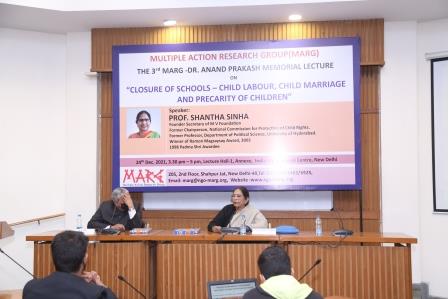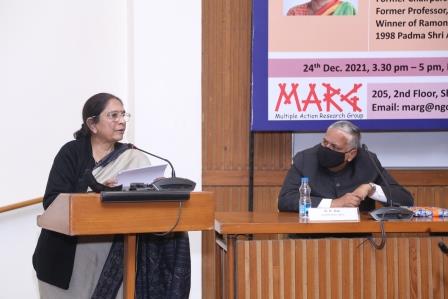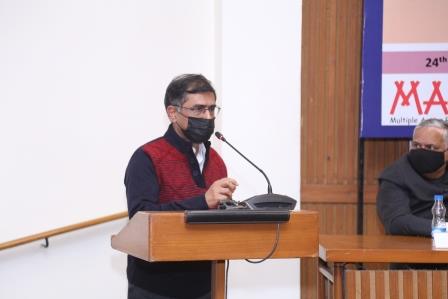THE 3RD MARG – DR. ANAND PRAKASH MEMORIAL LECTURE
ON
“CLOSURE OF SCHOOLS-CHILD LABOUR, CHILD MARRAIGE AND PRECARITY OF CHILDREN”
This event was organized by MARG in the India international Centre on the 24th of December, 2021. This event had gained remarkable success as it had achieved the sole objective for which it was organized that is imparting valuable knowledge on the “impact of closure of schools on child marriage, child labour and precarity of children”, owing to Prof. Shantha Sinha who was the first and former chairperson of national commission for protection of child rights, founder secretary of MV foundation, former professor at department of political science, university of Hyderabad, a well-known child rights activist, winner of Ramon Magsaysay award and a 1998 Padma Shree awardee.
The event consisted of K K Rai, the chairperson of MARG, who introduced the topic and made the audience aware of the contributions of late Dr. Anand Prakash to jurisprudence and the evolution of law. He also appreciated Prof. Shantha Sinha’s contributions towards the society and said that “one thing that impresses me the most is that she could see the issue of the children with the right perspective, normally what happens is that when we are dealing with poverty, depravity and other things, we have an angle of charity rather then realising that we are only recognizing their right to have what is being given to them”.
Following which Prof. Shantha Sinha delivered the speech on the topic. She beautifully gave valuable insights on the topic by discussing the impact of closure of schools on Childrens in three phases i.e., before lockdown, during lockdown and after lockdown. She pointed out the loop holes in the previous law on child labour as it only prohibited children from working in hazardous workplaces, to which she argued that a child solely belongs to school and the situation of children engaged in work is completely non-negotiable. She added there shall be no excuses for children not going to school, it is the state’s responsibility to ensure that every child goes to school. But with the occurrence of pandemic, the situation on child rights became much more clear.
She stated that prior to the pandemic, the situation was completely different. Parents had started to realise that education was the only key to break the intergenerational barrier of poverty. There was also a reduction in child labour, children from rural areas had started migrating to cities in search of better education. Though the children knew they would face many economic and social barriers in cities but still they decided to fight and overcame the barriers.
She then explained the various problems that emerged with the imposition of lockdown in the country due to the pandemic. She stated that the situation during the lockdown was very precarious. Food hunger prevailed with the closure of schools in most of the families who were dependent on mid-day meals provided by the government. Children who were going to schools prior to covid were now working just to add up to the family income. These children who were engaged in child labour were not used to hard labour, at times sustained serious injuries to which they were not provided with any medical facilities.
She then explained the situation which prevailed after lockdown. She stated that the government didn’t think about the mid-day meals children were deprived of, the state and central government could have intervened and made children realise the importance of their rights but regretfully no attempt was made. The only option they resorted to was online education. With the prevalence of online education, many parents worked day and night just to buy smartphones for their children, the only thing they wanted was education for their children. Many parents in the rural areas who were able to buy phones for their children faced other problems such as non-availability of electricity and Wi-Fi. They were trapped in a cycle which had no end to it.
She then explained the importance of schools in the life of children, she stated that schools are the only place which keeps children away from social evils such as child labour and child marriage. Schools play an important role in shaping their childhood and act as a catalyst to stimulate peer growth. But schools are losing all this due to online mode of learning. After the schools were reopened, schools were no more schools, there was shortage of staff, high demanding fees, lack of facilities which the children had the right to be entitled with. This situation could have been better if the government had intervened.
She ended her speech by saying that “children belong to schools and that’s the only place they should be, excuses for children not going to schools is completely non-negotiable. But as the situation of pandemic has resulted in child right crisis, the Federal or the state government should intervene and address the situation as more delay would make the prevailing situation of child right crisis more uncertain”.
Prior to lockdown, schools were the only place where most of the girls could socialise and meet new peers. But with the closure of schools, they had lost this right and were confined to their homes, owing to which most of the girls were pushed towards marriage. The situation during lockdown was a bizarre one, she added
At the end of the lecture Advocate Saurabh Anand Prakash, board member of MARG gave vote of thanks to all in which he expressed his gratitude towards members of MARG for organizing these lectures which provide the audience with valuable knowledge about the social problems prevailing in the society. He also appreciated the way Prof. Shantha Sinha expressed her views on the topic in various phases. He then stated that this situation of child right crisis would have never arisen if the government had played an important role in addressing these issues during its initial stages. He ended his vote of thanks by saying “although this situation of child right crisis has arisen, the government should take calculated measures to eradicate the problem and plan carefully accordingly for the future.”









